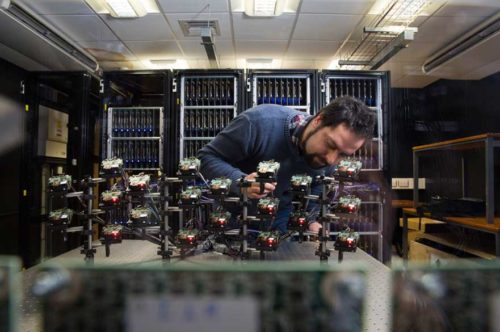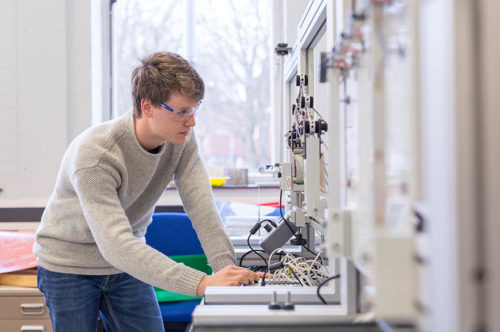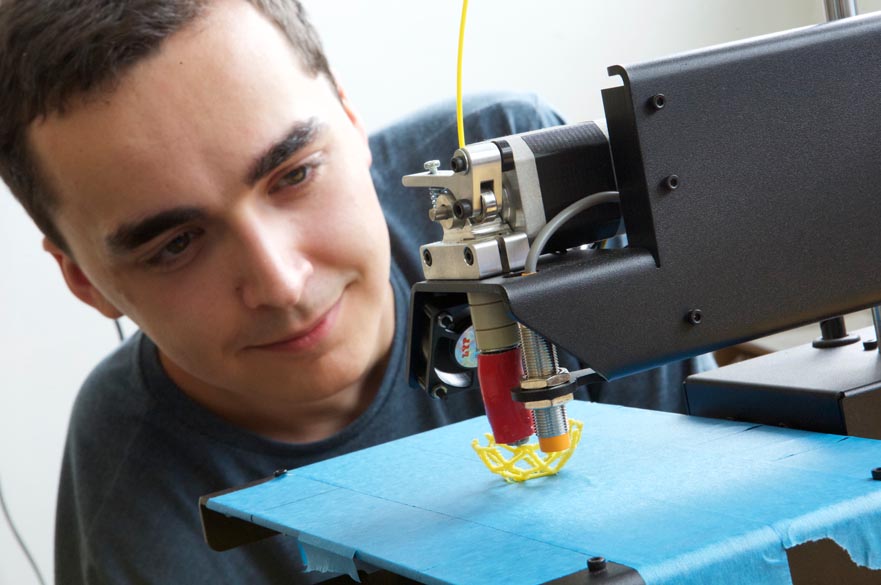The MSc Strategic and Digital Marketing course is a one year (full-time) or two-year (part-time) taught postgraduate course that is triple accredited with the following professional marketing, digital, and public relations regulatory bodies:
- Institute of Data and Marketing and its sister organisations the Data & Marketing Association (IDM/DMA)
- Chartered Institute of Marketing (CIM)
- Public Relations & Communications Association (PRCA)
It is recognised both in the UK and worldwide as a quality course.
The MSc Strategic and Digital Marketing course is aimed at undergraduate students fresh from their undergraduate studies, or those with a few years experience, as well as ‘seasoned’ practitioners wishing to consolidate and/or establish new learning and skills. The course content, which is taught in the heart of Cardiff and online, aims to nurture the next generation of marketing practitioners, strategists and leaders, who are commercially responsive to audience research insights, to develop meaningful value propositions and implement innovative and sustainable multi-channel offerings through agile and creative business models. Students are provided with a uniquely creative platform to conceptualise, the process of going to market through contemporary marketing strategies, planning, practice and research insights, and implement value propositions to complex real-world challenges.
The guiding philosophy of MSc Strategic Digital Marketing is to actively seek new ways of ‘doing business’ through agile business modelling and is underpinned by thematic areas of study aligned to global socio-economic challenges, including effectual altruism, consumption and sustainable economies; communities of practice and interest, tribal participation; and business model technology-enabled futures and omnichannel implementation.
At USW, we acknowledge that the only constant is change, and none more so than the current environment. This new and exciting course reflects the challenges new managers and existing leaders in marketing face, exploring the role of marketing in delivering value for individuals, businesses, and society.
The course is delivered by award-winning international teaching, learning, and research experts in the areas of marketing, digital, and public relations. Teaching within the course has a clear purpose, which is to build students’ professional autonomy as individuals who are responsive to emerging concerns, and disruptive in co-creative and future-oriented organisations.
Additionally, students on the MSc Strategic and Digital Marketing course are:
- Automatically given membership to Institute of Data and Marketing (IMD) and can gain a GDPR award.
- Given access to a host of resources, networking events and skill development experiences provided by both the IDM and DMA.
- Given access to the Chartered Institute of Marketing (CIM), who have a prolific network of professional marketers’ hub in the UK and around the world.
- Entitled to, dependent on your previous qualifications, be exempt from some of course content* of the MSc Strategic and Digital Marketing, in addition to having access to free online learning and networking events and opportunities provided by the PRCA.
What you will study
The MSc Strategic Digital Marketing course is founded on developing a critical understanding of key theoretical constructs and is guided by a common vision shared by the teaching team, which is to ensure that students develop the professional capabilities needed to successfully work in the Strategic Digital Marketing sector.
The course content is informed by industry reports such as the CIM Competency Framework and the IDM/DMA Skills Census, and teaching activities will focus on the practical application of theory and the development of professional skills. The use of case studies, expert guest and industry speaker’s masterclasses, and networking events and simulations exemplify this approach as does the inclusion of the Personal and Professional Skills Development module. This module runs throughout the course and allows students to gain certifications, knowledge and learning experiences that are relevant to the main course module deliveries. You will undertake a personal and professional learning/training needs analysis to understand your hard and soft skill gaps, and tailor your development based on these gaps. The module focuses on the development of professional and employability skills, and where possible, students who complete the professional skills workshops will receive an industry certificate or qualification. For example, students completing the Google Analytics workshop will be encouraged to sit the Google Analytics Individual Qualification (GAIQ) exam.
FULL-TIME Course
1 Year
Term 1 – September to November
Personal and Professional Skills Development
This unique module complements our core module delivery – you will not only be learning the theoretical underpinning of each of the subject areas, but you will also study and attain learning that is specific to you. The module aims to develop and enhance the employability of students by providing them with the opportunity to develop the personal and professional skills valued by the strategic and digital marketing industry employers. Students will identify learning opportunities for personal and professional development which will be signposted to relevant online or learning /networking opportunities by the course leader and module tutors coinciding with module delivery and USW provision – to ensure Personal and Professional Development can take place. In addition, you will be applying this learning to real world and live client projects (or your own projects) throughout the course, which means that by the time you complete your study you will have valuable evidence of your learning and its application.
Strategic and Digital Marketing Research Insights
In this module students will gain knowledge and skills in the development of both applied marketing and digital audience focussed research as well as the academic and theoretical underpinning research philosophies and methodologies. It aims to enable the learner to conduct and apply robust academic and business practitioner research develop market sensing and learning abilities. To do so, the module aims to develop the learner’s critical understanding and skills of research theory and practice in a strategic and digital marketing context. Develop the learner’s understanding defining value for the audience and organisation through MIS, MR, Market Intelligence, and cross-disciplinary methods. Critically review a range of research methodologies and select as appropriate those that are relevant to the aims and objectives of the research. Provide the learner with a skill set to manage the practical aspects of planning, conducting, and producing a research project and meet professional body requirements for research skills, knowledge, and practitioner accreditation.
Contemporary Marketing and Digital Strategies
Explore the models and frameworks of contemporary strategic and digital marketing strategy, their relationships and antecedents and their potential for contextual application.
Term 1 – 2: December to January
Personal and Professional Skills Development
As above.
Integrated Marketing Communications
This module aims to equip students with the knowledge and tools required to design and plan the implementation of campaigns in an agile manner. Through this module, students will be able to define the key considerations, forces, frameworks, and steps of a campaign plan and design an adaptable campaign which aligns with brand and customer requirements demonstrated through practical digital practice.
Term 2: January to April
Personal and Professional Skills Development
As above.
Strategic Brand Management in the Age of Uncertainty
This module seeks to acknowledge that we are living in an era where rapid change has become the norm. This module critically explores how brands are proactively and pragmatically responding to the challenges created by a global environment that is constantly in flux. Therefore, this module aims to introduce students to key theories of branding and brand reputation management and to develop a critical awareness of the external challenges of managing brands in the global environment.
Strategic and Digital Marketing Consultancy Project
This module aims to critically explore and examine strategic and digital marketing project management, and consultancy skills in a strategic and digital marketing context. Enabling students to understand and explore relevant and key project management principles. Students will be able to use consultancy skills to reflect, monitor, and evidence the ‘management of self’ in a strategic and digital marketing context.
Term 3: May to September
Strategic and Digital Marketing Dissertation OR Strategic & Digital Marketing Major Project
Students choose either the dissertation or major project option after discussion and consultation with the course leader. Both aim to allow students to develop a deeper understanding of their area of specialisation or practice, provide students with an opportunity to undertake either an extended piece of independent focused research or a major project of a substantial nature, to further develop students’ abilities to produce an extended piece of formal written work and to professionalise career skills.
PART-TIME Course (2 Years) – recommended delivery
Year 1
Term 1: September to mid-November
Personal and Professional Skills Development.
Strategic and Digital Marketing Research Insights
Term 1-2: December to January
Personal and Professional Skills Development.
Integrated Marketing Communications
Term 2: January to April
Personal and Professional Skills Development
Strategic Brand Management in the Age of Uncertainty
Year 2
Term 1: September to mid-November
Personal and Professional Skills Development
Contemporary Marketing and Digital Strategies
Term 1-2: December to January
Personal and Professional Skills Development
Term 2: January to April
Personal and Professional Skills Development
Strategic and Digital Marketing Consultancy Project
Term 3: May to September
Strategic and Digital Marketing Dissertation OR Strategic and Digital Marketing Major Project
Teaching
The course is delivered as a blended approach i.e. learning will take place weekly both online and on-campus.
Contact hours will be between 10-12/week over two days/evenings
Additional individual study hours will vary between modules, but an average would be 20-30 hours
Guest lectures will be provided and based on availability and by module.
Student activities will be based on lecture/tutorial/seminar (live and/or pre-records) and workshop activities engagement.
Often employer engagement and opportunities are mediated through careers, campus events or module assessment methods as these are often based on live client briefs.
Assessment
There are no exams.
All assessments are coursework – with presentations, reports, essays and project work (group and individual) being used as well as opportunities for individual personalised learning and assessment via the Personal and Professional Development module.
Zobacz więcej na stronie uniwersytetu >>
Wiza studencka do Wielkiej Brytanii
Aby studiować w Wielkiej Brytanii potrzebujesz wizy studenckiej. Aby złożyć wniosek o taką wizę studencką musisz zdjać certyfikat językowy na poziomie B2.
Uważaj! Do celów wizowych musisz wybrać wyłącznie egzamin w wesji Secure English Language Test (SELT) UKVI .
Co to jest test SELT UK VI registration? Przeczytaj więcej o testach SELT UKVI >>











